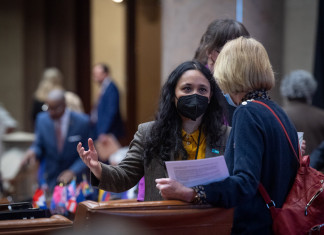More than 300 historic buildings in Rhinebeck could be affected by a Historic Preservation law being explored by the Rhinebeck Town Board, prompted in part by the urging of Town Historian Nancy Kelly.
Kelly said the purpose of the law would be to “maintain the historic character” of Rhinebeck.
The Town’s Board of Trustees would playing a role in maintaining Rhinebeck’s historical buildings. The board decided at its May 13 meeting that it will seek more information about creating the preservation law.
The proposition to look further into such a law was brought to the board by Trustee Joe Gelb, who said there were many options for what kind of authority a Preservation board or commission has. The Village of Rhinebeck already has a Historic Preservation law.
Gelb said he would ask Julian Adams, a community liaison coordinator for the State Historic Preservation Office to address the town board.
“Let’s have the guy down, if that’s the consensus, hear what he has to say, and then decide whether we want to go through the things that would be involved in such a law,” he said.
Gelb said that the law would likely affect, at least, the 341 buildings in the Town of Rhinebeck that are on the National Register of Historic Places, which was created by the National Historic Preservation Act of 1966. In one version of the proposed law, Gelb said, the board “would have power to designate new buildings” as being historic.
“[A law] would allow us to have people who are more specialized than the planning board or zoning board look at proposals that are on the National Register,” Kelly said.
Gelb said that on one extreme, such a board could have final say over any significant changes to a building in the same way that a planning or zoning board would.
In another scenario, according to Gelb, owners of these buildings could be required to at least consult with a preservation board, but the board would not have final authority over building projects or adjustments.
The third extreme, Gelb said, would be that no changes would be allowed to the buildings at all.
“Ideally [a preservation board] should have a final say,” Kelly said. But, she added, there would be a process for an appeal when the board’s recommendations “aren’t feasible.”
Gelb said he will seek to have a presentation on the issues made “sometime in June.”
Board member Bruce Washburn expressed some reservations about a such a law, worrying about the extent of a preservation board’s control.
“Where I was concerned the last time we talked about this was that it was beyond the buildings, that it was artifacts and all kinds of things,” Washburn said. But, he added, “I think bringing the guy in from SHPO makes a lot of sense.”







Facebook Comments